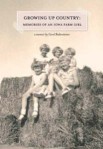 Welcome to Author Wednesday. Today I’m pleased to introduce you to Carol Bodensteiner. Carol released her first novel, Go Away Home, this past month, and she’s stopped by to talk a little bit about writing this World War I-era novel set in rural eastern Iowa. Her first book, Growing Up Country, is a memoir of growing up in Iowa in the 1950s. It’s so nice to have you visit today, Carol. Congratulations on publishing your first novel. Tell us about Go Away Home.
Welcome to Author Wednesday. Today I’m pleased to introduce you to Carol Bodensteiner. Carol released her first novel, Go Away Home, this past month, and she’s stopped by to talk a little bit about writing this World War I-era novel set in rural eastern Iowa. Her first book, Growing Up Country, is a memoir of growing up in Iowa in the 1950s. It’s so nice to have you visit today, Carol. Congratulations on publishing your first novel. Tell us about Go Away Home. What’s the one sentence pitch for this work of historical fiction?
What’s the one sentence pitch for this work of historical fiction?
Thanks for inviting me to Author Wednesday, P.C. Go Away Home is the story of a young woman’s quest for independence and the right to decide her own future set against a twentieth century backdrop when options for women were limited yet social change was occurring and the Great War was on the horizon.
What is the main message you wanted to convey in this novel?
Go Away Home explores the reality that life is not as simple, or the choices as clear-cut, as we often hope they are, and that when confronted with the conflict between dreams and reality we learn there are tradeoffs. To get one thing, we often must give up something equally important.
We don’t really grow up until we’re confronted with those gray areas in life. This lesson is an important one to address. Tell us how you came up with the idea for Go Away Home.
Ever since I was a small child and learned that my grandfather died of the Spanish flu in 1918, I’ve been fascinated by my connection to that major world event. In a way my novel creates a life for the man I never knew and for the grandmother I only knew as a stern old woman. Since I never asked my grandmother a single question about my grandfather and their lives together, the story is entirely fiction.
I did that in my last novel with my grandfather. It was a way for me to create the grandfather I wanted. I’m glad you were able to do this in your fiction as well. Since this is set one hundred years ago, what type of research did you do?
My research covered everything from photo studios, clothing, apprenticeships, boarding houses, electricity and telephones, to attitudes toward German immigrants during World War I. I roamed the Living History Farms, the State Historical Society Library, and the stacks at the public library. I spent hours with an uncle who grew up on a farm pre-electricity and with a high school classmate whose family owns a rural telephone company. I found on-line issues of Kodak magazines for photographers and YouTube videos about driving a Model T. I couldn’t have dreamed up things half as interesting as the reality I found through my research.
I was impressed with the wide range of issues you tackled in Go Away Home. I think it’s very interesting that YouTube helped you learn about the Model T. I know that both of your books are set in the same place in Iowa. What role does setting play in your novel?
Setting is critical to the story, representing one of the basic choices my main character Liddie faces. She grows up on a farm and though she wants desperately to get to the city with all the excitement and opportunities that represents, her connection to the farm and the kind of life she had there is stronger than she realizes.
I feel a strong connection to place myself and find conveying place is important to my writing. In addition to the larger “city vs. country” settings, there are smaller places very important to the story. Some readers have commented that the grove, which Liddie retreats to, is almost like another character.
I enjoyed the process Liddie went through in her discovery of what she really wanted in life. It’s a timeless study of maturing from a child to a woman. Without giving us a spoiler, tell us a little bit about your favorite scene in this book.
I have so many, but here’s one. Liddie relishes life and keeps adding more to her plate. In the effort to juggle everything, she makes a serious mistake. She hopes her employer won’t notice, but of course she does and calls Liddie out on it. While Liddie is ashamed of how she initially tries to hide the problem, she stands up and takes responsibility. A real growth moment for her.
I related to that moment. You captured the feelings perfectly. I’ve been there so I was rooting for Liddie all the way. What is the best thing someone could say about this book?
I think the best thing someone could tell me is that they were touched by the characters and the story. That would mean they felt the story was well told, which was my goal in the first place. The second best thing is that they came away from the book knowing more about life in the early twentieth century.
You scored on both counts with me. The characters have stayed with me after finishing the book, and I learned a few things about the life my father (born in 1904) and my grandparents might have lived. I hope you’ll come back and visit when you publish your next novel.
Thanks for letting me share my stories with your readers.
You’re very welcome, Carol. I enjoyed getting to know you a little bit better, and I enjoyed reading Go Away Home.
Be sure to watch for Book Review Friday and my review of Carol’s historical novel, Go Away Home.
 About Carol Bodensteiner – Carol is a writer who finds inspiration in the places, people, culture and history of the Midwest. After a successful career in public relations consulting, she turned to creative writing. She blogs about writing, her prairie, gardening, and whatever in life interests her at the moment. She published her memoir Growing Up Country in 2008.
About Carol Bodensteiner – Carol is a writer who finds inspiration in the places, people, culture and history of the Midwest. After a successful career in public relations consulting, she turned to creative writing. She blogs about writing, her prairie, gardening, and whatever in life interests her at the moment. She published her memoir Growing Up Country in 2008.  Go Away Home is her debut novel.
Go Away Home is her debut novel.
Links (Click below)
Go Away Home is available on Amazon in paperback and eBook.
Click here to read the first chapters now.
Growing Up Country: Memories of an Iowa Farm Girl is available on Amazon in paperback and eBook.
9 responses to “Author Wednesday – Carol Bodensteiner”
Thanks for introducing another great writer to a wider audience. I have read “Go Away Home” and loved it. Best of luck to both of you! 🙂
LikeLike
Thanks, Christoph. It is a wonderful novel. I have her memoir on my TBR list.
LikeLike
Thanks, Christoph, for reading and endorsing!
LikeLike
This was a great interview. Thank you for sharing it.
LikeLike
You’re welcome. I hope you’ll check out her books as well. Thanks for stopping by.
LikeLike
Thanks. Patricia’s questions made this a fun interview.
LikeLike
Patricia, Thanks for inviting me to visit your blog. Good questions! Carol
LikeLike
I’m always amazed by the research some authors do. Gosh, writing is so difficult and time consuming (that’s besides being incredibly fulfilling and enjoyable, of course) and I’m so impressed with those who find the time and have the motivation to tackle subjects that they have to learn so much about.
Great interview, PC!
LikeLike
Historical fiction is definitely such a commitment to research–meticulous research. Carol does it very well.
LikeLike